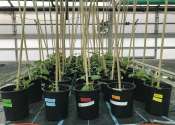Flavor or flavour (see spelling differences) is the sensory impression of a food or other substance, and is determined mainly by the chemical senses of taste and smell. The "trigeminal senses", which detect chemical irritants in the mouth and throat as well as temperature and texture, are also very important to the overall Gestalt of flavor perception. The flavor of the food, as such, can be altered with natural or artificial flavorants, which affect these senses.
Flavorant is defined as a substance that gives another substance flavor, altering the characteristics of the solute, causing it to become sweet, sour, tangy, etc.
Of the three chemical senses, smell is the main determinant of a food item's flavor. While the taste of food is limited to sweet, sour, bitter, salty, and savory (umami) – the basic tastes – the smells of a food are potentially limitless. A food's flavor, therefore, can be easily altered by changing its smell while keeping its taste similar. Nowhere is this better exemplified than in artificially flavored jellies, soft drinks and candies, which, while made of bases with a similar taste, have dramatically different flavors due to the use of different scents or fragrances. The flavorings of commercially produced food products are typically created by flavorists.
Although the terms "flavoring" or "flavorant" in common language denote the combined chemical sensations of taste and smell, the same terms are usually used in the fragrance and flavors industry to refer to edible chemicals and extracts that alter the flavor of food and food products through the sense of smell. Due to the high cost or unavailability of natural flavor extracts, most commercial flavorants are nature-identical, which means that they are the chemical equivalent of natural flavors but chemically synthesized rather than being extracted from the source materials. Identification of nature-identical flavorants are done using technology such as headspace techniques.









